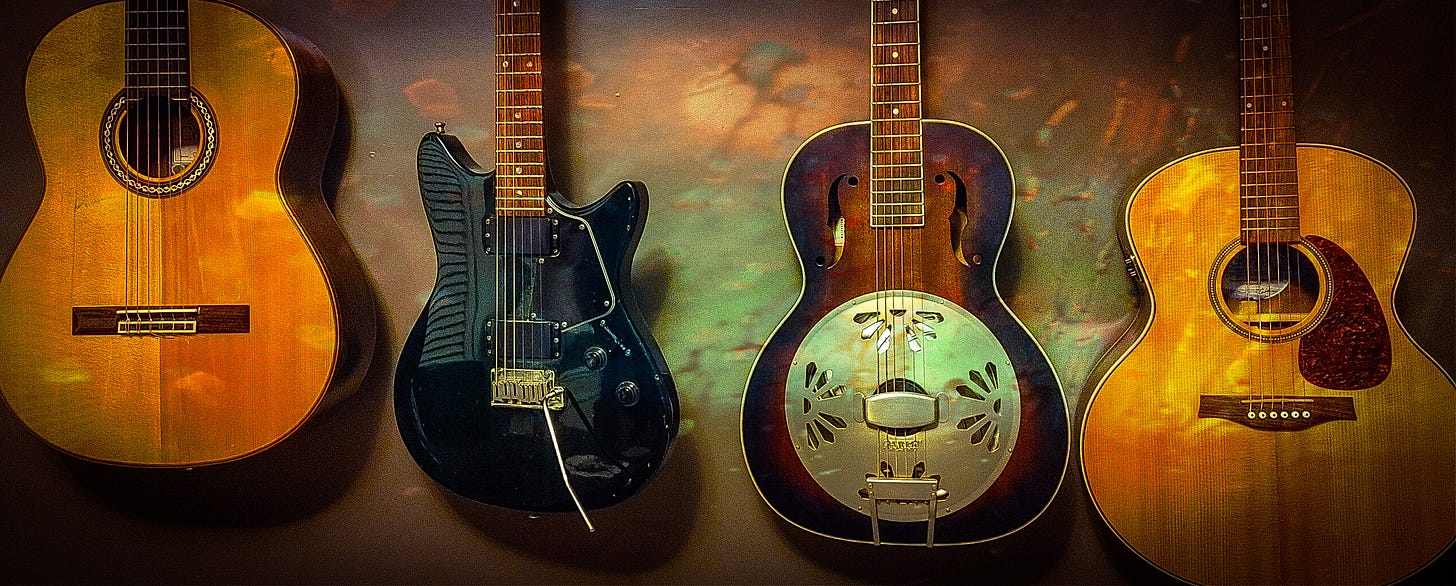What Kind of Guitar Should I Learn On?
by Ken Hiebert
From those wishing to begin the journey of learning to play the guitar, this is a question that I hear a lot.
Usually this question is interpreted as:
Should I start on electric guitar or acoustic guitar?
When it comes to teaching guitar, I much prefer to start my younger beginners on an acoustic — specifically a nylon string (classical) guitar for a number of reasons.
Here’s my top 4:
1. Simplicity. In its most basic incarnation, a guitar is really just a wooden box with strings stretched across it. It’s amazing the music that can be created with something so simple. You don’t have to worry about hooking up amplifiers and cables with all the issues that entails. I’m talking about amp settings, effects, cables that crackle and inputs that don’t work properly (common on cheap electric guitars). These things only serve to distract from learning and playing.
2. The width of the neck. Electric guitars generally have a narrower neck which on the surface would seem desirable because it technically makes it easier for the fingers to reach up to the lower strings. Here’s the problem with that - it also makes it easier to mute strings you don’t want to mute when playing chords because the strings are that much closer together, so the strings just stop ringing. For beginners, everything is a hard stretch anyway so it’s much better to play on something that will give you a clear, clean sound with less effort.
3. Classical guitars. I much prefer a nylon string (classical) guitar for beginners because the neck is a little bit wider than a steel string acoustic (see #2). Also these guitars have a smaller body size (compared to steel string acoustics) so they’re easier and more comfortable to hold, and the nylon strings are much easier on the fingers than steel strings. This is currently my guitar of choice for all those reasons.
4. Technique. All the techniques that apply to acoustic guitars also apply to electric guitars and are easily transferrable. Some techniques (like string bending) are more applicable to electric guitar but are not necessarily even relevant for beginners since it would be considered an intermediate technique. On electric guitar it’s also very easy for beginners to pull notes sharp without even trying so again, my object would be to make the initial learning phase as least frustrating as possible.
Having said all this, I feel I now need to clarify that I’m not necessarily against people starting on electric guitar, and for some it may actually be a better choice, but after teaching both for the last 15 or so years, I’ve definitely noticed these issues over and over again.
Now my disclaimer: I am a fingerstyle acoustic player. I love the sound and the simplicity of the acoustic guitar. I love it for the reasons I mentioned above as well as so many other reasons. I may therefore also be somewhat biased. Regardless, the main reason anyone should want to play guitar is for enjoyment. If you think you would much rather enjoy playing electric guitar over acoustic guitar, you would still be doing yourself a huge favour by getting a good basic understanding of the acoustic guitar first.





